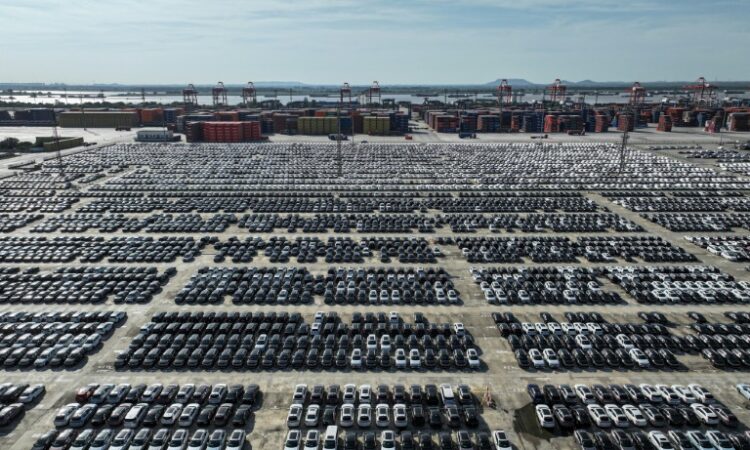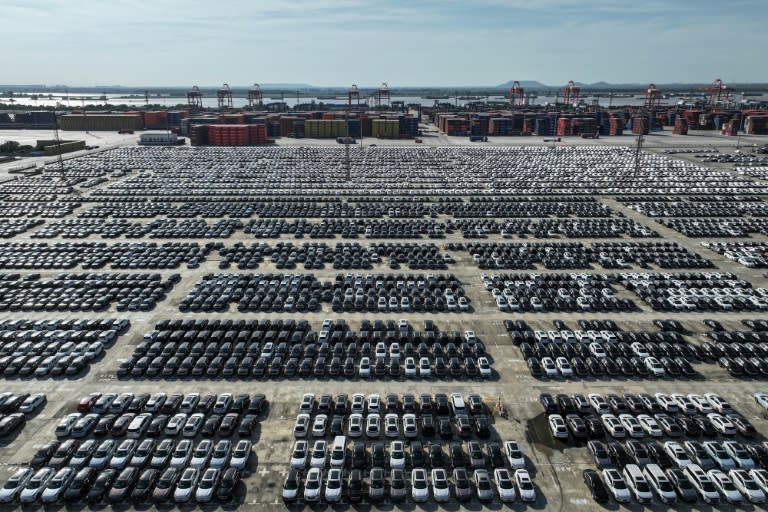

The European Union will impose additional provisional duties of up to 38 percent on Chinese electric cars from Friday after concluding manufacturers in China benefited from unfair state support.
Here’s why the Chinese electric vehicle market has raised hackles among European policymakers — and what impact the move could have:
– How did China’s EV sector get so strong? –
China has spearheaded a targeted industrial strategy to boost its EV sector, pouring vast state funds into domestic firms as well as research and development.
Between 2014 and the end of 2022, the Chinese government said it had spent more than 200 billion yuan ($28 billion) on subsidies and tax breaks for EV purchases alone.
The approach has given Chinese firms a critical edge in the race to provide cheaper, more efficient EVs over leading European automakers, which have not always enjoyed such state largesse.
They have also been boosted by surging domestic demand: Of all new EVs sold globally in December last year, 69 percent were in China, according to the research firm Rystad Energy.
Exports are soaring. According to the Atlantic Council, Chinese sales of EVs abroad rose 70 percent in 2023, reaching $34.1 billion.
Almost 40 percent went to the European Union, the largest recipient of Chinese EVs.
The EU market share of Chinese-made EVs climbed from around three percent to more than 20 percent in the past three years, according to the European Automobile Manufacturers’ Association.
– Who are the key players? –
The overwhelming market leader from China is BYD, which this year posted record annual profits for 2023 and says it aims to be among the top five car companies in Europe.
Last year, it became the first manufacturer to pass the five million milestone in terms of hybrids and all-electric vehicles produced, cumulatively — crowning itself as “the world’s leading manufacturer of new energy vehicles”.
Among the other top Chinese EV makers exporting to Europe are SAIC, MG Motor and Polestar — owned by Volvo and its Chinese parent firm Geely — according to state media.
– Why is the EU worried? –
The surge in exports has allowed Chinese firms to rapidly increase their share of the EU market for EVs.
The EU has now concluded that Chinese manufacturers benefited from “unfair subsidisation, which is causing a threat of economic injury” to European automakers.
But there is also dissent within the EU — Germany, a major trade partner whose car market is heavily reliant on China, warned tariffs would harm German companies.
The EU will now impose provisional duties between 20 and 38 percent on top of the current 10 percent tariff on Chinese electric cars.
Definitive duties will take effect in November for a period of five years, pending a vote by the EU’s 27 states.
– How has Beijing reacted? –
Beijing has yet to react but a Chinese trade group condemned the bloc’s “protectionism”.
China has already bared its teeth however, kickstarting an anti-dumping investigation into pork imports from the EU, threatening Spanish exports.
In January, China launched an anti-dumping investigation into brandy imported from the EU, in a move seen as targeting France, which had pushed for the commission’s probe.
Beijing said in June it “reserves the right” to file a case with the World Trade Organization over the EU tariffs.
– How have car manufacturers reacted? –
Since the EU’s move will impact all Chinese-made electric cars, Tesla’s Model 3, the electric Mini, and the Volvo EX40 are also among the vehicles that will face higher duties.
A Tesla spokesperson said prices for the Model 3 — the number three in electric car sales in Europe — should increase “in the short term”.
China’s electric car makers Nio and XPeng told AFP they had no plans to quit the European market after the announcement.
Meanwhile, MG France said it already imported 2,600 electric vehicles from China that have cleared customs.
– What impact will the tariffs have? –
Germany’s Kiel Institute for the World Economy, alongside Austrian institutes, predicted the higher taxes will reduce vehicle imports from China by 42 percent.
Electric car prices could rise by an average of 0.3 to 0.9 percent in the EU, they added.
Cui Dongshu, secretary-general of the China Passenger Car Association, said costs for Chinese exporters of EVs and EU consumers would increase, and the duties would also hit the bloc’s energy conservation and green development goals.
burs-oho-raz/ec






